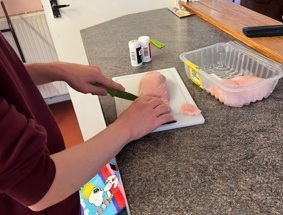There are dozens of alternative ways to have a baby. Here are some options you can consider when you can’t have children the conventional way.
If you’ve found out that you can’t have children through conventional means or have been trying to get pregnant for months or even years without success, we understand that you may feel heartbroken and devastated. Please remember, this is not your fault and absolutely nothing to be ashamed of.
You may be struggling to come to terms with being unable to conceive through traditional means, but when you’re ready, there are many alternative ways to start or grow a family that couples can explore.
Although it might not be the road you thought you’d go down, dreams of building a beautiful and loving family can still become a reality.

Accepting you can’t have a baby conventionally
Before you start researching alternative ways to have a baby, you may need to take some time to process the idea of not having children or another child the conventional way. How you do this looks different for every person, but having time to contemplate can help you recognise which route into starting or growing your family would be most suitable for you.
You may find it beneficial to talk to a therapist or counsellor so you can work through your feelings and find a way to accept your circumstances before exploring your choices.
Alternative Ways to Have a Family
Whether you’re a couple, single or LGBTQIA+, there are many options you can consider.
-
Fertility Treatment
If you haven’t already, speak a fertility specialist. They will be able to assess whether you or your partner have any underlying health conditions that could make conceiving more challenging. The fertility doctor may then recommend surgery, medication or assisted conception to help you and your partner have better chances of conceiving.
-
Surgery
If you’re a woman and have a condition such as endometriosis, fibroids, or blocked fallopian tubes, your doctor may advise surgery. They may also suggest surgery if you’re a man and have a condition such as a blocked epididymis, which can affect ejaculation. They may consider using surgery to extract sperm if you have had an unsuccessful vasectomy reversal or have a condition which prevents sperm from being released.
Please bear in mind that although surgery might be a good option for you, it isn’t a guarantee that you’ll be able to conceive. Like any surgery, there will be risks involved, but your doctor should talk these through with you. Don’t be afraid to ask questions about recovery times, success rates and pain management so you can make an informed decision.
-
Fertility Medication
Doctors may prescribe fertility medications such as clomifene, tamoxifen or gonadotrophins to encourage ovulation in women who don’t ovulate every month or at all. If you have polycystic ovary syndrome (PCOS), a doctor may prescribe Metformin to reduce insulin levels that can impact ovulation. Gonadotrophins may also be prescribed to men who have low sperm mobility to stimulate the production of sperm.
Although fertility medications could help you conceive a child, you may experience side effects when taking them, and they may not be suitable for everyone. If a medical professional does suggest this kind of treatment, you may need time to reflect on whether it is the right pathway for you.
-
Assisted Conception
If you’re a heterosexual couple, a same-sex couple or a single woman, assisted conception could help you conceive.
Assisted conception procedures include:
- In vitro fertilisation (IVF): This procedure involves harvesting an egg and sperm from each partner or donor before combining them in a laboratory. If the combination is successful, embryos are implanted into the woman’s uterus.
- Intracytoplasmic sperm injection (ICSI): This procedure is similar to IVF, but instead of allowing the sperm to fertilise the egg on its own, the sperm is injected directly into the egg.
- Intrauterine insemination (IUI): sperm from a male partner or donor is inserted directly into the uterus when the woman is ovulating.
The NHS offer some assisted conception procedures, depending on whether you meet the eligibility criteria in your local area. Criteria can include age, amount of time you’ve been trying to conceive and having no children. If you don’t meet the criteria, you may be able to receive treatment through a private clinic.
Like fertility medication and surgery, assisted conception comes with risks that your doctor should discuss with you before you go down this route.
-
Surrogacy
If you’re a same-sex couple, if pregnancy poses health risks or if it isn’t possible to carry a pregnancy to term, surrogacy could be an option for you. Surrogacy means selecting a woman who is both healthy and willing to carry your baby and give birth to them.
Many couples choose someone they know, while others work with a fertility clinic to select a suitable surrogate they’ve never met before. An embryo is either donated or created by the parents before being implanted into the surrogate’s uterus.
Although surrogacy is legal in the UK, you can only pay for a surrogate’s expenses. When they give birth to your child, they will have parental responsibility until you have applied for a parental order or adopted the child.
-
Adoption
Adoption is where you become the legal parents of a non-biological child, and the rights of the birth parents are removed and transferred to you. It’s a wonderful way to build your family and give a vulnerable child a loving, new home.
With adoption, there are children and young people of all ages who need new homes and families, from newborn babies up to older teenagers.
To adopt, you need to apply through an adoption agency, and there is a two-stage process that takes about six months to complete. If approved, the agency will try to match you with a child, followed by a few weeks of planned introductions. If everything is successful, the child will move into your home.
-
Fostering
If you’d like to become a parent or grow your family while also making a huge difference in the lives of children and young people, fostering could be the route for you.
Fostering is incredibly rewarding. It allows you to give children and young people a second chance at a happy childhood alongside beginning a new career with plenty of personal and professional development opportunities.
There are many types of fostering, and signing up with an independent fostering agency like ours will provide you with the most options. Whether you give children and young people a temporary home in an emergency or a permanent home as a long-term foster parent, fostering will change your life and theirs.
What are the requirements to foster a child?
There is a process you’ll need to follow, but as long as you’re over 21, have a spare room, and have the legal right to live and work in the UK, you already meet the initial requirements to become a foster parent.
At FCA, we celebrate diversity, welcoming foster parents from all walks of life. Your relationship status, sexual orientation, gender identity, race, ethnicity and culture will not impact your eligibility to foster. You can also foster if you already have children, something that could prevent you from receiving free fertility treatment through the NHS.
When you foster with FCA, there are many other benefits, including:
- Generous fostering allowances – to cover the expenses of having a child in your care and reward you for your hard work and dedication.
- Bonuses – every year, you’ll receive a summer and winter bonus.
- Rewards – you’ll have easy access to discounts to cut the costs of days out, meals and groceries.
- 24/7 support – our fostering experts will support you day and night.
- Training – you’ll join our professional training programme and learn everything you need to know about looking after a foster child.
- Our Stars Scheme – this exclusive scheme acknowledges, rewards and appreciates all our foster parents.
- Activities & Events – from the Big Sing Off to coffee and cake, we organise activities and events so you can make friends, have fun and enjoy life as a foster parent.
Can you adopt a foster child?
The goal is always to reunite foster children with their birth parents if and when it’s considered safe to do so; however, that doesn’t always happen. If you foster a child long-term, you may form a beautiful bond to the point where adoption makes sense.
Although it is not always straightforward, adopting a foster child is possible. You’d need to speak with your foster agency and social workers about your intentions, as ultimately, it will come down to what’s best for the child.
Want to foster a child or learn more about fostering?
Fertility struggles or being unable to conceive through traditional means can be challenging for anyone who longs to start or grow a family. But now you’re aware of some possible pathways to parenthood, you can reflect on which route is best for you.
And we’re here to help. If you want to learn more about becoming a foster parent or if you have any questions about the process, then download our guide, Fostering 101: The Beginner’s Guide to Fostering a Child.
Or, contact our friendly and supportive team, who will gladly answer any questions you have.














